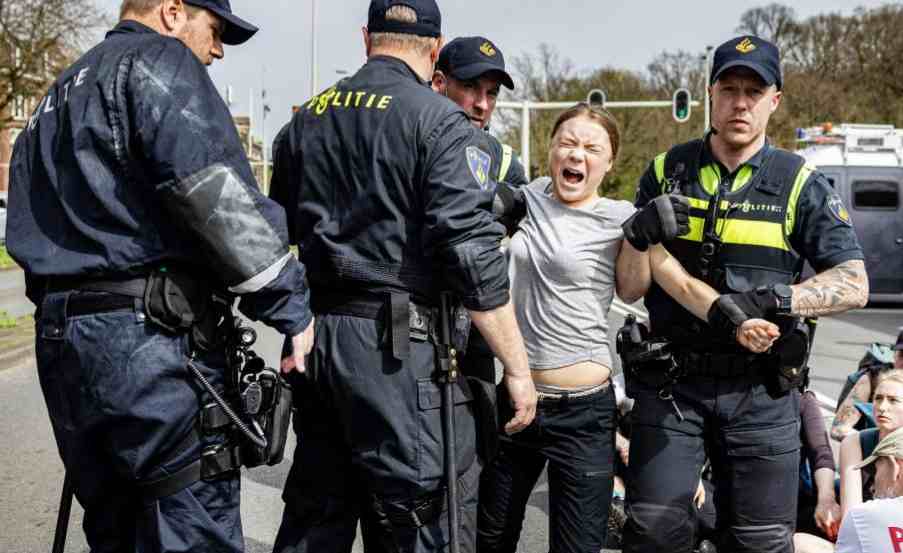Climate activist Greta Thunberg’s arrest, along with several other demonstrators, marked a symbolic moment in the ongoing struggle for climate action.

Swedish climate activist Greta Thunberg, renowned worldwide for her unwavering dedication to environmental causes, found herself at the center of attention once again, this time in The Hague, where she was arrested during a protest against fossil fuel subsidies.
Also Read:- Taiwan Earthquake: Devastation Strikes with Tsunami Threats
The 21-year-old, accompanied by hundreds of demonstrators, took to the streets on a mission to challenge Dutch government policies that support companies within the fossil fuel industry, including energy giant Shell and airline company KLM.
The protest, organized by Extinction Rebellion (XR), aimed to disrupt the status quo and draw attention to the urgent need for climate action. As Thunberg joined the ranks of fellow activists marching under a banner boldly proclaiming “STOP FOSSIL SUBSIDIES,” the event garnered significant media coverage and public interest, thanks to her global prominence in the fight against climate change.
Despite the scorching heat of the day, activists remained undeterred in their mission to make their voices heard. Traditional Dutch songs were sung with a climate-conscious twist, adding a poignant backdrop to the calls for environmental justice.
However, tensions rose as the peaceful demonstration turned into a standoff between protesters and law enforcement officers, who sought to prevent the blockade of a major road.
Also Read:- Havana Syndrome: Unraveling the Russian Connection
Thunberg’s arrest, along with several other demonstrators, marked a symbolic moment in the ongoing struggle for climate action. Despite facing potential consequences for her activism, Thunberg remained steadfast in her commitment to the cause, emphasizing the importance of collective action in addressing the planetary emergency we face.
The Dutch government’s tax concessions for fossil fuel-related industries became a focal point of the protest, as activists aimed to increase pressure ahead of an upcoming debate on the issue. By targeting the A12 highway, a key artery of transportation, protesters aimed to disrupt business as usual and draw attention to the devastating impacts of continued fossil fuel reliance.
The response from authorities, while not unexpected, highlighted the broader societal tensions surrounding climate activism. While Thunberg described her arrest as ‘peaceful,’ reports emerged of subsequent arrests, including a second arrest for Thunberg herself. Despite the temporary disruption to traffic, the message resonated: urgent action is needed to address the climate crisis, and individuals like Thunberg are willing to take a stand, even at personal risk.
As the dust settled on the protest, questions lingered about the effectiveness of such demonstrations in effecting real change. However, Thunberg’s activism has consistently demonstrated the power of grassroots movements to influence policy and public opinion.
From her humble beginnings as a solitary protester outside the Swedish parliament to her global prominence as a leading voice for climate action, Thunberg’s journey serves as a reminder of the impact that one individual can have in shaping the course of history.
Also Read:- University of Missouri Student Riley Strain’s Body Found in Cumberland River in West Nashville
In the aftermath of the protest, as traffic resumed on the A12 highway, the conversation surrounding fossil fuel subsidies and climate policy continued to reverberate. While Greta Thunberg‘s arrest may have been a temporary setback, it served as a rallying cry for activists around the world to continue the fight for a sustainable future.
As governments grapple with the challenges of transitioning to a low-carbon economy, voices like Thunberg’s remain essential in holding those in power accountable and advocating for meaningful change.
